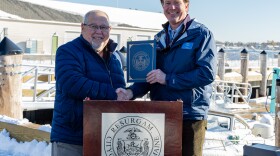
Molly Enking
Climate EditorMolly grew up in Southern Maine, went to school in Baltimore, then worked as a journalist in New York City and Florence, Italy. But, Maine's siren call was too strong and it was time to come home! Molly got her start in journalism covering national news at PBS NewsHour Weekend, and climate and environmental news at Grist. She received her MA from the CUNY Graduate School of Journalism with a concentration in science reporting. She was a fellow at the Marine Biological Laboratory in Woods Hole, reported from the U.N. Climate Summit, and was one of the first NYC TV journalists out in the field reporting on COVID-19.
Molly loves paddleboarding, pottery, and has a special fondness for camping at Baxter State Park.
-
What is ‘plug-in’ solar, and will it be coming to Maine anytime soon? Plus, an everyday but little-known source of carbon pollution.
-
The treatment will begin in 2027, and was made possible by an over $2 million grant by the U.S. Department of the Interior.
-
As Immigration and Customs Enforcement officers continue to ramp up operations in cities and towns throughout the state, a group of Maine lawyers led a protest through Portland's Bayside neighborhood Friday afternoon.
-
The good, the bad and the ugly: a climate year in review. Maine Public’s Climate Desk unpacks the top climate stories in 2025, in Maine and beyond.
-
As the ground freezes, it becomes harder for underground aquafers to refill with rain or snow runoff.
-
Researchers are using old Christmas trees to restore Popham Beach’s eroding dunes — but is it working? Plus, how to avoid the holiday consumerism trap.
-
A federal judge has ruled that the Trump Administration unlawfully ended a Federal Emergency Management Agency program designed to help states prepare for and mitigate the effects of natural disasters.
-
As the Gulf of Maine warms due to climate change, invasive sea squirts have become a major issue for the aquaculture industry, weighing down equipment and colonizing underwater surfaces.
-
The collaboration will focus on protecting Portland's working waterfront and coastal areas from sea level rise, as well as meeting sustainability goals like electrification.
-
Inside an ambitious effort to conserve tens of thousands of acres in historic Wabanaki territory. Plus, salt alternatives to melt ice while protecting the environment.











